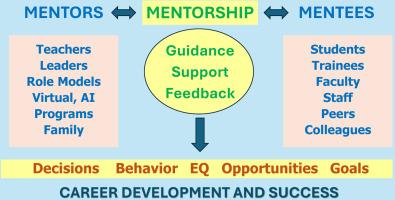导师在职业发展中的重要性。
IF 3.6
2区 医学
Q1 PATHOLOGY
引用次数: 0
摘要
接受导师的指导和帮助是职业发展和规划的一个重要组成部分,特别是在学术医学和生物医学研究领域,资源和工作机会的可用性正变得越来越具有挑战性。导师与学员分享他们的智慧、经验、内容专业知识和网络,以提供想法和反馈,识别和打开机会,处理问题并避免错误,特别是帮助评估涉及职业道路和工作选择决策的许多个人和专业因素。适当地识别、吸引和利用导师是职业发展的关键部分,有效的导师可以来自几个来源,包括个人互动、被动的角色榜样和人工智能。提供指导是一项重要的责任,包括各种风险和利益,在承担导师的角色之前应该清楚地了解。此外,导师应该通过考虑时间、技能和兴趣来仔细评估接受谁作为指导者,以满足他们自己和他们未来的指导者的期望。随着人们对导师价值的认识不断提高,越来越多的学术健康中心、医学院和院系都在提供项目,帮助他们的学生、学员、教职员工更好地获得、理解和利用导师机会,同时也提供项目来提高那些对成为有效导师感兴趣的人的技能和能力。本文章由计算机程序翻译,如有差异,请以英文原文为准。

The Importance of Mentorship in Career Development
Receiving guidance and help from mentors is an essential component of career development and planning, especially in academic medicine and biomedical research, where the availability of resources and job opportunities are becoming more challenging. Mentors share their wisdom, experience, content expertise, and networks with mentees to provide ideas and feedback, identify and open opportunities, deal with problems and avoid mistakes, and especially to assist in evaluating the many personal and professional factors involved in decision making about career paths and job options. Identifying, engaging, and utilizing mentors appropriately is a key part of career development, and effective mentorship can come from several sources, including personal interactions, passive role models, and artificial intelligence. Providing mentorship is an important responsibility that includes various risks and benefits that should be clearly understood before the role of mentor is undertaken. Moreover, mentors should carefully assess whom to accept as a mentee by considering the time, skills, and interest needed to meet their own expectations along with those of their prospective mentees. With increasing awareness of the value of mentorship, more academic health centers, medical schools, and departments provide programs to help their students, trainees, faculty, and staff better access, understand, and take advantage of mentorship opportunities, as well as offer programs to enhance the skills and abilities of those interested in being effective mentors.
求助全文
通过发布文献求助,成功后即可免费获取论文全文。
去求助
来源期刊
CiteScore
11.40
自引率
0.00%
发文量
178
审稿时长
30 days
期刊介绍:
The American Journal of Pathology, official journal of the American Society for Investigative Pathology, published by Elsevier, Inc., seeks high-quality original research reports, reviews, and commentaries related to the molecular and cellular basis of disease. The editors will consider basic, translational, and clinical investigations that directly address mechanisms of pathogenesis or provide a foundation for future mechanistic inquiries. Examples of such foundational investigations include data mining, identification of biomarkers, molecular pathology, and discovery research. Foundational studies that incorporate deep learning and artificial intelligence are also welcome. High priority is given to studies of human disease and relevant experimental models using molecular, cellular, and organismal approaches.

 求助内容:
求助内容: 应助结果提醒方式:
应助结果提醒方式:


